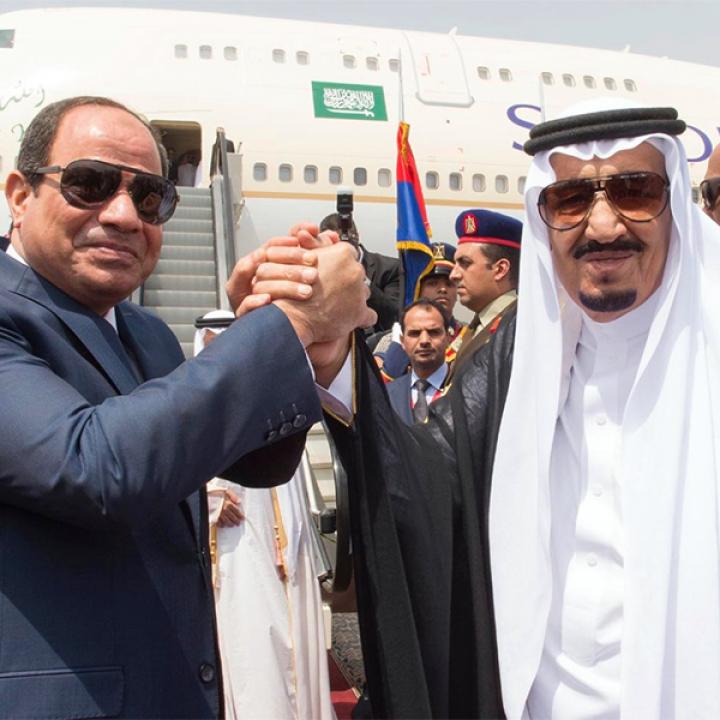
- Policy Analysis
- Articles & Op-Eds
A Familiar Pattern in Egypt's Spat with Saudi Arabia

Cairo has sought to placate Saudi and American officials while reaching out to their respective adversaries in Damascus and Moscow, but this balancing act may soon topple if Riyadh and Washington withhold crucial funding.
To Washington foreign policy watchers, recent tensions between Egypt and Saudi Arabia may evoke a familiar pattern. Egypt's support this month for a Russian resolution over Syria in the United Nations Security Council angered Saudi Arabia to the point that the Saudi UN ambassador publicly criticized Egypt's vote. The Saudis oppose Russian efforts to prop up Syrian leader Bashar al-Assad and preferred a competing French resolution that sought to halt Russia's bombing of Aleppo.
Saudi Arabia has also poured substantial aid into keeping Egypt afloat, particularly in recent years. After Egypt's first elected president, Muslim Brotherhood leader Mohamed Morsi, was ousted in July 2013, Riyadh rushed $5 billion to Cairo. It pledged an additional $4 billion in March 2015, and King Salman signed agreements worth $25 billion in April.
This support of post-Morsi Egypt reflects Saudi concerns about the Muslim Brotherhood's regional ambitions as well as Saudi beliefs that a stable Egypt would bolster Riyadh's defense against Iran and its proxies. Egyptian President Abdel Fattah Al Sisi seemed to accept this implicit bargain, telling King Salman in March 2015 that Egypt considered the security of Arab Gulf states a "red line."
To officials in Riyadh, however, Mr. Sisi has not honored his end of the deal. He has refused to send troops to bolster Saudi efforts against the Iranian-backed Houthis in Yemen, and he has refused Saudi requests to get involved militarily in Syria. During King Salman's visit in April, the Egyptian government attempted to smooth over differences by recognizing as Saudi territory two Red Sea islands that Egypt has administered since 1982. Egyptian courts, however, stalled the handover.
The UN vote highlighted differences in how Egypt and Saudi Arabia regard the Syrian conflict. Riyadh worries that Mr. Assad's survival would bolster Iran, its chief rival. Cairo worries about the Sunni Islamist groups most actively fighting Mr. Assad, mindful of its own battles against Islamist groups (albeit with a substantially lower death toll). Cairo has been open about this difference in strategic perspective: Foreign Minister Sameh Shoukry said after meeting his Iranian counterpart in September, "The Coalition fighting in Syria may want to change the regime in the country, but that is not Egypt's position."
On Sunday Mr. Sisi appeared interested in improving relations with the Saudis. He thanked Riyadh for its generous support since Mr. Morsi's overthrow and said that differences over Syria shouldn't undermine the broader partnership. He also called for delivery of the subsidized petroleum shipment that Saudi Aramco, the state-oil company, withheld in the wake of the UN vote. On Monday, however, Egyptian officials hosted the Syrian intelligence chief for talks, and Syria's state news agency reported agreement to "strengthen coordination in the fight against terrorism."
Mr. Sisi has not kowtowed to his benefactor because he knows that Saudi Arabia considers Egypt vital to its own regional interests. Egypt watchers in Washington may recognize a pattern: Despite $1.3 billion in annual U.S. military aid to Egypt, bilateral relations have deteriorated over political disagreements. Meanwhile, Egypt's strongman leader has strengthened his partnership with Russian strongman Vladimir Putin: Cairo signed a $3.5 billion arms deal with Moscow in September 2014. A $25 billion loan from Russia to build a nuclear power plant in Egypt was announced in May. Cairo is hosting joint military exercises with Russia this month.
As with its approach toward Syria, the Sisi government's embrace of Russia reflects a convergence of interests against Sunni Islamist groups. And much as he does with Saudi Arabia, Mr. Sisi routinely emphasizes his desire to strengthen the U.S.-Egyptian strategic relationship even as he engages Washington's chief adversary more intimately.
So far, Mr. Sisi's bet that he can get away with this behavior without losing foreign assistance has been right. But Saudi Arabia's withholding of the petroleum aid and Washington's decision to shift more than $100 million earmarked for Egypt to other countries suggest that changes might be afoot.
Eric Trager is the Esther K. Wagner Fellow at The Washington Institute and author of the new book Arab Fall: How the Muslim Brotherhood Won and Lost Egypt in 891 Days. This article originally appeared on the Wall Street Journal blog "Think Tank."
Wall Street Journal


